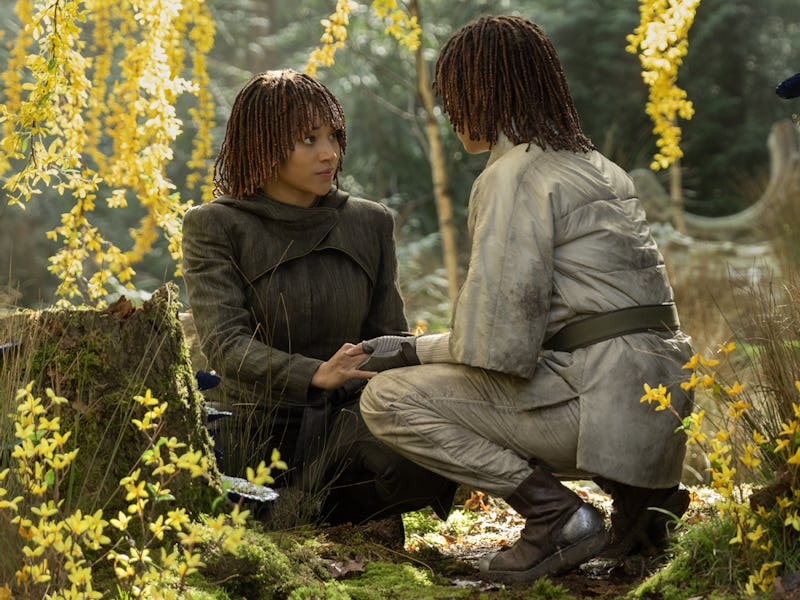Lucasfilm’s Cowardice Is Finally Catching Up With It
As the studio ignores The Acolyte, it puts the entire Star Wars saga at risk.

Amandla Stenberg wasn’t surprised by The Acolyte’s abrupt cancellation.
“I’m gonna be transparent and say that it’s not a huge shock for me,” the 25-year-old actor recently admitted via Instagram, citing the waves of “vitriol, prejudiced hatred, and hateful language” that the cast and crew faced from the very beginning. Before anyone had seen the series, The Acolyte found itself at the center of an “anti-woke” campaign — and Stenberg argues that “echo chambers” full of fanboys and trolls might have influenced Lucasfilm’s decision to abandon the show.
“The way that these events have unfolded is also due to the hyper-divisiveness of the time that we live in,” she shared. “That is driven, at this point, by echo chambers of thought and algorithms that reinforce our biases.”
Anyone who’s spent an extended time in fandom spaces is all too familiar with these echo chambers: in the Star Wars fandom especially, a vocal minority can feel like an overwhelming rabble. That’s partly because these sects have been allowed to move unchecked against diverse stories for almost a decade. The Acolyte faced the same backlash that plagued Lucasfilm’s first earnest push for diversity, The Force Awakens; the studio was just as silent then as it is now, and there’s no sign of that strategy changing any time soon.
No one’s saying that The Acolyte was a perfect series, nor should it transcend any (constructive) criticism. But Lucasfilm’s choice to cancel the series outright — rather than stand by its cast and crew, address the show’s flaws, and give it the space to succeed — speaks more to its own cowardice than it does to any sound business sense. Left unchecked, that could actually cause more trouble than The Acolyte ever could.
The Acolyte wasn’t perfect, but it deserved a chance to prove its worth.
Lucasfilm has long chased four-quadrant appeal — the Star Wars films spearheaded by George Lucas were designed as family affairs — and that instinct only doubled once Disney acquired the studio in 2012. Somewhere along the way, though, that spiraled into a general fear of risk-taking... or of ruffling any feathers. Even before Lucasfilm pivoted sharply to streaming after two box office failures, the studio was incapable of standing behind any of its “risky” choices. Let’s not forget its international campaign for The Force Awakens: When promoting the film in China, the studio downplayed (or outright erased) the importance of characters of color, like John Boyega’s Finn and Oscar Isaac’s Poe Dameron.
That strategy felt especially craven after sects of the fandom called to boycott the film for alleged “anti-white propaganda.” (Yes, really.) Lucasfilm never took a stance against those comments — and at the time, it truly did seem like a vocal minority spewing unfounded objections, relatively harmless in the grand scheme. But Finn’s treatment in subsequent films suggested that the studio had taken that backlash to heart: though he was positioned as a key player in the sequel trilogy, Boyega was later sidelined in The Last Jedi and The Rise of Skywalker. The same went for Kelly Marie Tran, who faced unrelenting backlash after her introduction in The Last Jedi. Tran had just one minute of screentime in The Rise of Skywalker, and her treatment remains a harsh reminder of Lucasfilm’s worst instincts.
“What I would say to Disney is, do not bring out a Black character, market them to be much more important in the franchise than they are, and then have them pushed to the side,” Boyega told GQ in 2020. “You guys knew what to do with Daisy Ridley, you knew what to do with Adam Driver. You knew what to do with these other people, but when it came to Kelly Marie Tran, when it came to John Boyega, you know f*ck all.”
Lucasfilm has long been afraid of rocking the boat — and that fear is actually jeopardizing the studio more than anything else.
For fans of color, the solution has always been clear: Lucasfilm needs to take its power back. Its relationship with the fandom is now akin to that between a parent and a spoiled child. When that vocal minority throws a tantrum, the studio seems to listen — and even give in to its demands. Those concessions were subtle at first: a reduced role here, a new director there. But now, almost a decade after The Force Awakens, the studio seems incapable of taking a stand. More importantly, it’s unwilling to take any risk.
That in turn has created a bubble where nothing real can ever exist. It’s why Lucasfilm’s recent output (with the exception of Andor) has been unbearably tame. The studio would rather make safe, placatory choices to save its own skin, leaving its most vulnerable collaborators to deal with the backlash alone.
Stenberg is right: The Acolyte’s cancellation isn’t surprising. It’s just the manifestation of years of spineless decision-making. The writing has long been on the wall, and the longer this trend continues, the less likely Lucasfilm is to attract the storytellers it needs to truly survive. Before long the studio will be stuck in that echo chamber with only its harshest critics for company — and by then, nothing it does will be able to appease its finicky fandom.